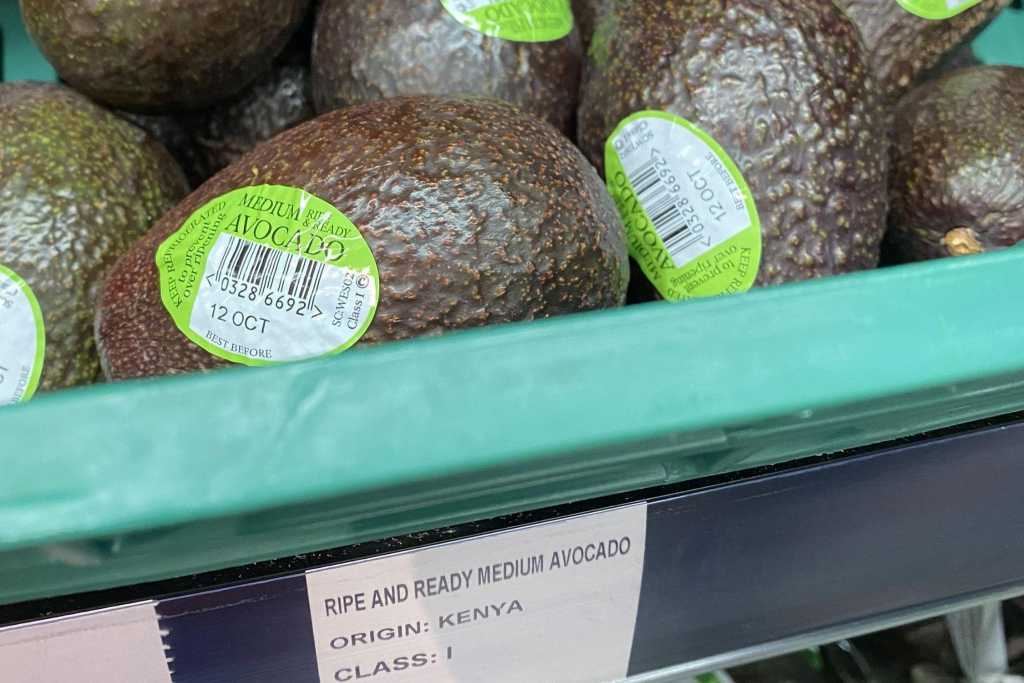Avocados in a UK supermarket exported by Kakuzi/ TheTimes
NAIROBI, Kenya Mar 17- Agricultural firm Kakuzi PLC has secured approval from the Kenya Plant Health Inspectorate (KEPHIS) to process and prepare export-grade fresh avocados for the Chinese market.
The approval comes barely a month after the Chinese government allowed Kenya to export fresh avocados after four years of lobbying as Beijing reversed an initial requirement that only allowed frozen produce.
China had locked out the import of fresh produce in 2019 due to the prevalence of fruit flies locally.
The deal to export avocado to China was struck in April 2019 between President Uhuru Kenyatta and his Chinese counterpart Xi Jinping but Beijing required Kenya to export only frozen avocado, which the majority of exporters could not manage owing to the high cost involved.
The directive saw only one firm out of over 100 meet the requirements laid down by the Chinese six months after Nairobi and Beijing signed the deal.
The agribusiness firm becomes one of the first local entities to secure the KEPHIS approval following a stringent phytosanitary audit for its extensive Kakuzi farms and packhouse.
As part of the implementation of the protocols, KEPHIS has been undertaking facility audits to ensure the integrity of local packhouses earmarked to provide packaging solutions for avocado exports.
Producers and exporters wanting to export fresh avocado to China will have to ensure that all their production farms, packhouses and fumigation treatment facilities are registered by KEPHIS.
They will also be required to apply Good Agricultural Practices (GAP) and maintain proper sanitary conditions as well as implement Integrated Pest Management programs, which include pest monitoring, chemical and biological control and any other pest control operations.
Speaking when he confirmed the firm’s facility inspection and approval, Kakuzi Plc Managing Director Chris Flowers said the Kakuzi fresh produce Packhouse and Orchards near Makuyu town had been inspected and found to be compliant with the high international standards.
“We recently were subjected to a series of random and procedural inspections by KEPHIS, and I am glad to announce that the Kakuzi’s orchards and Packhouse are among the first approved large-scale farming and packing operations, cleared for the Chinese market,” Flowers said.
“At the Makuyu facility and Orchards, we maintain world-class phytosanitary standards for our exports to Europe, and the KEPHIS approval further serves to underscore our quality commitments,” he added.
Last year, Kakuzi received an unconditional renewal on a crucial globally recognised agricultural food quality certification.
As part of the Nairobi Securities Exchange (NSE) listed firm’s quality management assurance endeavours, Kakuzi received the GLOBALG.A.P. version 5.2 certificate following a recent production and processing procedures audit.
GLOBALG.A.P. is a private-sector body that sets voluntary standards (based on Good Agricultural Practices) for certifying agricultural products around the globe.
The certification allows Kakuzi to produce avocados for export to the European market with a recognised mark of quality issued by NSF Certification Ltd, a UK based certification body.
“At Kakuzi PLC, we have invested more than Kshs 200 million in the last one year to guarantee quality production and environmental management practices leading to such certifications as the GLOBALG.A.P. To attain such a globally recognized certification, it calls for sustained co-operation and commitments by all our stakeholders to maintain the highest possible production and environmental management standards,” Flowers said.
He added that “To ensure that our locally produced fruits meet the global standard, we have continued to invest in globally benchmarked staff training and production facilities and practices making us a truly Kenyan but world-class agro-business firm.”
China initially wanted Kenyan farmers and traders to freeze the fruits to negative 30 degree Celsius after peeling off the skin and chill further to negative 18 degrees while in transit to the destination, meaning that farmers have to invest heavily in cold rooms to meet the requirement.

















